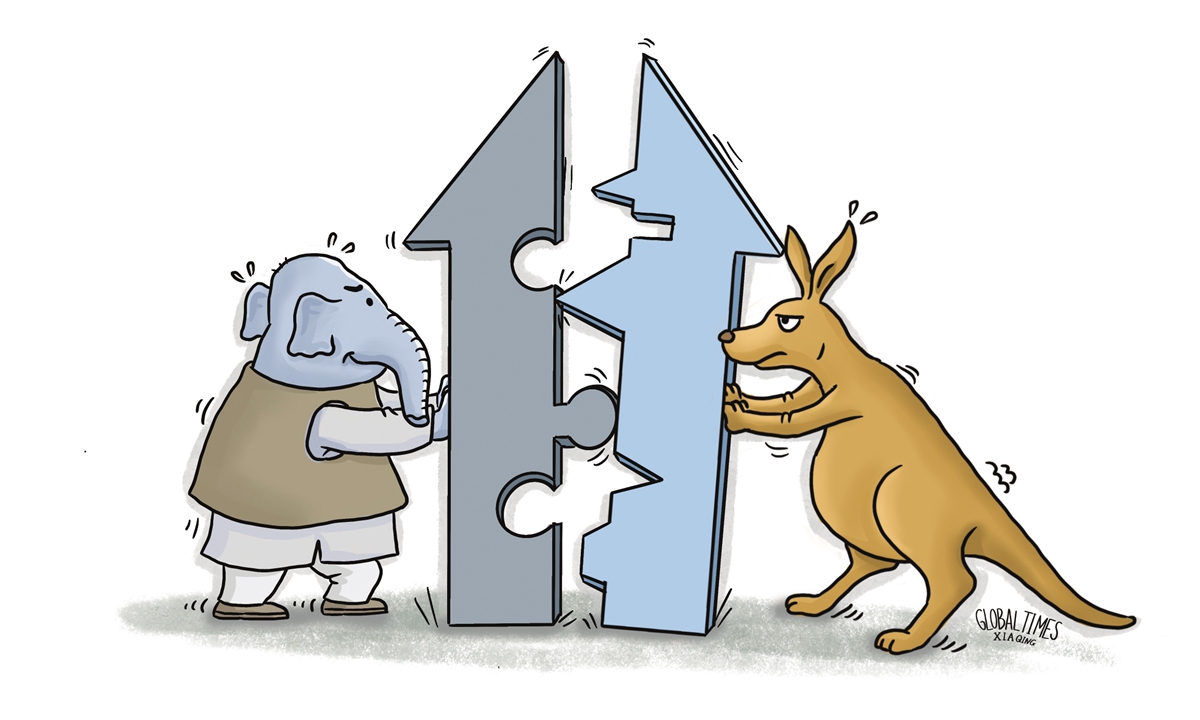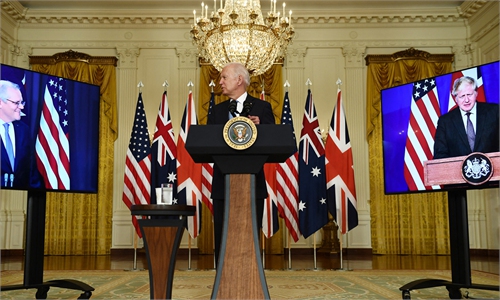
Illustration:Tang Tengfei/GT
Free trade talks between Australia and India are reportedly getting close to reaching an interim deal, which is immediately described by some media as a tool to cut their reliance on China. The interim free trade agreement (FTA) is expected to be clinched as early as this month as both nations seek to cut their economic dependence on China, Nikkei reported on Wednesday.
Negotiations between India and Australia to promote a comprehensive economic cooperation arrangement dated back to as early as 2011. To conclude the marathon talks and reaching a deal did not come easy. To reach a full-fledged FTA, both sides still have a long way to go, and the narrative that the deal is to counter China is misplaced.
There are obvious obstacles in India and Australia's FTA push. Voice of America (VOA) claimed last August that while India is particularly concerned that its domestic agriculture sector could be overwhelmed after a FTA deal allows Australian agricultural products to enter the India market, and Australia is reluctant to issue less restrictive visas for Indian workers.
Given such obstacles still exist even as the two countries are approaching an interim deal, more efforts are needed in order to reach a final agreement. What behind India's refusal to the Regional Comprehensive Economic Partnership (RCEP) is a sense of caution about opening up India's markets for dairy and other agricultural products to Australian competition, according to Nikkei. It takes courage for both India and Australia to resolve the differences that will impact vested interests.
If the interim agreement can be smoothly concluded this month as reported, it will be a boost for Australia and India's coronavirus-hit economies. However, if it is hijacked by radical anti-China politicians to undermine their beneficial trade ties with China, those attempts will surely cause more pain for the people in the two countries.
Although China-India and China-Australia bilateral relations have encountered setbacks in recent years, the pair still enjoy mutually beneficial economic and trade relations. According to data from China's customs, bilateral trade between China and India surged 43.3 percent year-on-year, reaching $28.14 billion in 2021. China-Australia trade reached $164.82 billion, up 35.1 percent last year.
This data proves that political posturing will never help economic and trade cooperation, and it also demonstrates that China, the world's manufacturing hub and the largest market, is increasingly serving as a stabilizer for global trade in the past years. If anti-China politicians in Australia or India continue to push trade "decoupling" with Chinese economy due to their anti-China paranoia, their people will suffer from their ill-willed decisions.
The anti-China forces in Australia have been whining about being the victim of China's "economic coercion," while serving as a pawn in the US' anti-China campaign at the expense of Australian business community. However, their tricks to defraud domestic political interests are clear to the domestic business community and are no longer effective. With a national election due by May, Australian Prime Minister Scott Morrison's anti-China strategy has failed to improve his government's polling, according to Bloomberg.
A closer look into the bilateral trade between China and India shows that past trade records have been surpassed despite protectionist or decoupling moves by India. Yet, India's discriminatory restrictions have shaken the confidence of Chinese companies operating in the Indian market. If India can't reverse the trend, the negative impact on bilateral trade is to be seen.
In addition, although India has actively promoted free trade negotiations with many countries after refusing to join RCEP, if it does not promptly correct its discriminatory and protectionist economic and trade policies, and does not call an end to its political interference in economic and trade issues, the country's efforts to promote openness will not stand the test of time.
The author is an editor with the Global Times. bizopinion@globaltimes.com.cn


